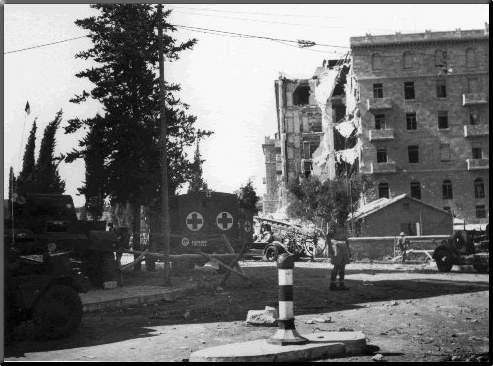The bombing of the King David Hotel occurred in July 1946 and some saw it as a pivotal moment in recent Middle East history. The King David Hotel was the site for the British Military Command in Palestine. It also served as the headquarters of the British Criminal Investigation Division. The bombing of the hotel galvanised the British into realising that their time in Palestine was coming to an end.
On June 29th 1946, the British unexpectedly entered the premises of the Jewish Agency and took away with them a large number of documents – some of which were deemed to be sensitive. All the documents were taken to the King David Hotel where they were to be assessed by intelligence analysts. At around the same time, the British arrested 2,500 Jews in Palestine. Irgun, a Jewish secret organisation (deemed to be a terrorist group by the British) decided to target the hotel for vengeance and also as a way of destroying the documents that had been taken by the British.
The leader of Irgun, Menachem Begin, claimed that Irgun saw the hotel solely as a military building – and therefore a legitimate target. Begin claimed that three warnings were sent out on July 22nd 1946 about the planned attack to keep casualties to the minimum. Begin claimed that three phone calls were made to a) to the French Consulate b) to the hotel itself and c) to the “Palestine Post”.
Any warnings were to no avail. The British did not evacuate the hotel and the bombing killed 91 people and injured 45. Ironically, few people in the hotel itself were killed – and Jews were among the casualties.

The Jewish National Council immediately condemned the attack.
Did the British know about the attack before hand? Were people sacrificed in an effort to disgrace the Jewish militant bodies in Palestine? For years, former members of Irgun claimed that the British did know about the attack and that warnings had been sent. For years the British denied that this was true. However, in 1979 evidence was presented to the House of Commons in London that Britain had received a credible warning. A former British Army officer based at the hotel admitted that he had heard other officers joking about a threat that had been made to the hotel. In later years, when Menachem Begin had moved into legitimate politics, he claimed that Irgun had sent a warning directly to the hotel but the person who sent the warning was told:
“We don’t take orders from the Jews.”
What were the repercussions of the bombing? In the short term, Britain hardened its attitude to what it deemed were terrorist organisations. In the mid to long term, it realised that its mandate to run Palestine was coming to an end. The troubles experienced by the British before World War Two in Palestine had now become a lot worse and it was unlikely that they would get better. When the United Nations declared the existence of Israel, Britain quickly withdrew what was left of its forces in what was now named Israel.